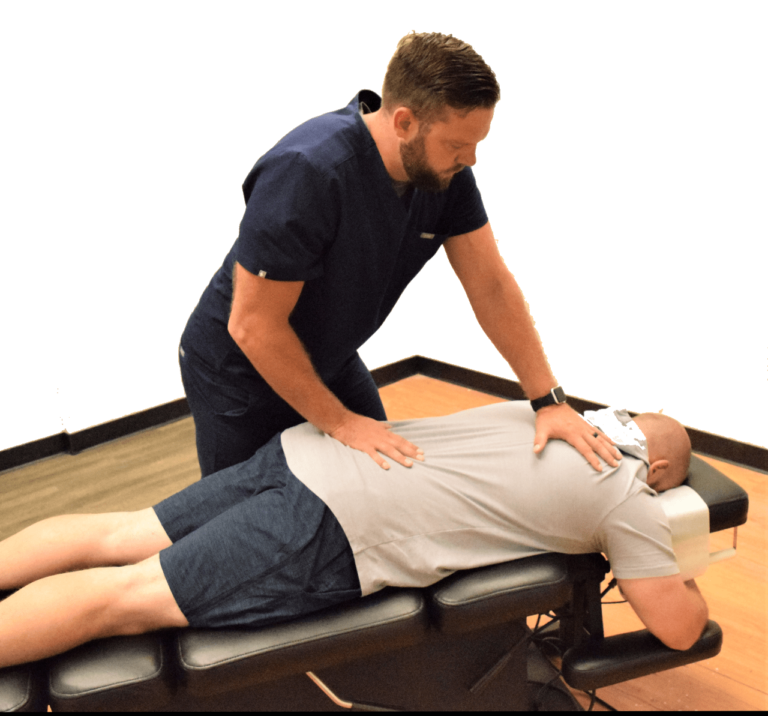As a tall person, you may deal with a myriad of issues; ducking under things and squeezing into cars and airplane seats are a few. But one of the most universal problems that tall individuals complain of is back pain.
Your longer spine and higher center of gravity can indeed put you at a disadvantage when it comes to spinal health. But this is just the tip of the iceberg, and the more you know about the “why” of it all, the better equipped you’ll be to prevent and manage these issues.
The question of the day is “Does being tall actually increase your risk of back issues, or are posture, lifestyle, and ergonomics the real culprits?” Read on as we take a closer look at the science, the common issues tall people experience, and practical strategies you can explore to get some relief – chiropractic care included.
The Science of Height and the Spine
The spine is flexible, supportive, and strong, but having a taller frame changes how external forces act on it. Here’s an overview of the science of height and your spine:
- Spinal length and leverage: The taller you are, the longer your spine will usually be. A longer spine puts more pressure on supporting muscles and joints than shorter spines do. So, postural shifts can put considerable strain on your muscles, discs, and joints.
- Center of gravity shifts: Taller people naturally have a higher center of gravity; this affects both balance and posture. The muscles have to work harder to maintain proper spinal alignment.
- Research insights: Some research studies suggest that taller individuals carry a higher risk of developing conditions like disc herniation and degenerative spinal changes. Height alone doesn’t determine your risk, but it can make your spine more vulnerable to stress over time.
Taken together, these factors help to explain why tall people may have to grapple with unique back health challenges. They also illustrate why maintaining good posture and ergonomics and getting regular preventative care is so vital.
Learn more about the causes of back pain.
Common Back Issues for Taller Individuals
It’s not uncommon for tall individuals to have back pain. But the source of the back pain may take you by surprise – the pain is linked less to height itself and more to mismatches with the environment. Some of the most common challenges include:
- Postural strain: The majority of desks, chairs, and counters are made for people of “average” height. This leads taller people to hunch forward to make up for the height differential. Over time, this postural stress may contribute to rounded shoulders and chronic pain.
- Neck pain and upper back discomfort: Staring down at screens or work surfaces positioned too low can place strain on both the cervical and thoracic spine.
- Lower back pain: When you stand for long periods or lift something without using proper form, it can strain the lumbar region of the spine and cause low back pain. This is especially problematic when your core muscles aren’t adequately supporting your spine.
- Spinal compression risks: Taller spines can also be more prone to issues related to compression (worsened scoliosis progression or increased wear on discs are a few).
Posture Challenges and Daily Ergonomics
The environment can often make life harder for tall individuals. From average-height desks and chairs to cramped cars and airplane seats, most spaces just aren’t made for tall people.
As a result, taller people have to bend, hunch, or squeeze themselves into odd positions, straining their backs in the process. Spinal misalignments can become permanent without correction.
Over time, these everyday adjustments can create real challenges for posture and overall spinal health. People may deal with chronic poor posture, reduced mobility, and persistent discomfort due to chronic posture issues.
Chiropractic Care for Taller Patients
Chiropractic care could be just what you need to combat the extra stress placed on your spine and the posture challenges created by environments that aren’t built for your frame.
Through spinal adjustments, chiropractors can help to restore proper alignment, relieve joint pressure, and improve mobility. This is especially helpful for individuals who grapple with chronic back stiffness and discomfort.
Chiropractic professionals are also able to provide posture correction therapy and craft personalized strategies that help taller patients adapt their workspaces and tweak their daily habits to better suit their tall height.
In addition to treating pain, going in for regular chiropractic visits can help reduce the risk of long-term spinal degeneration. It can also help patients maintain or regain spinal flexibility. If you’ve been looking for a natural, drug-free approach to back pain management, chiropractic care is an effective, non-invasive option to consider.
Lifestyle Tips to Reduce Back Problems if You’re Tall
To prevent back pain if you’re tall, you’ll need to make proactive choices. Here are some evidence-based tips for less painful days:
- Invest in ergonomics: Adjustable desks and chairs with lumbar support help you maintain a natural spinal position.
- Strengthen your core: Strong abdominal and back muscles lessen spinal strain. Activities like Pilates, yoga, or weight training are excellent for strengthening your core.
- Stretch regularly: Daily hamstring, hip, and thoracic spine stretches improve flexibility and relieve tension.
- Lift wisely: When lifting, use your legs (not your back), and keep objects close to your body. This will minimize leverage stress.
- Stay active: Movement nourishes spinal discs and prevents stiffness. Avoid long periods of sitting or standing without breaks.
- Seek professional care: Persistent pain should be addressed by a chiropractor or healthcare provider before it becomes a chronic issue.
Do Tall People Always Have More Back Problems?
Are you guaranteed to have more back problems just because you’re tall? The answer is “no.” Height can be a risk factor in the development of back pain in tall people, but it’s not the only one.
Sedentary habits, bad posture, and weak core muscles can all strain the spine, even in shorter people. On top of that, genetics and body weight can influence spinal health more strongly than height alone.
Also worth considering is the fact that many tall people live completely pain-free by staying active, strengthening their core, and paying close attention to their posture.
Conclusion
Although tall people are at a higher risk of spinal stress, that doesn’t mean you have to lie down and accept long-term back pain. If you take up the right fitness routine, make adjustments for ergonomics, and seek professional support as needed, you can have a healthy back. This applies whether you’re 5’1 or 6’6.
If you’re tall and dealing with recurring discomfort, call up a chiropractor for personalized, proactive support. And remember that back issues can be degenerative; addressing back pain early can be the difference between long-term chronic pain and living life more comfortably with a healthy spine.





